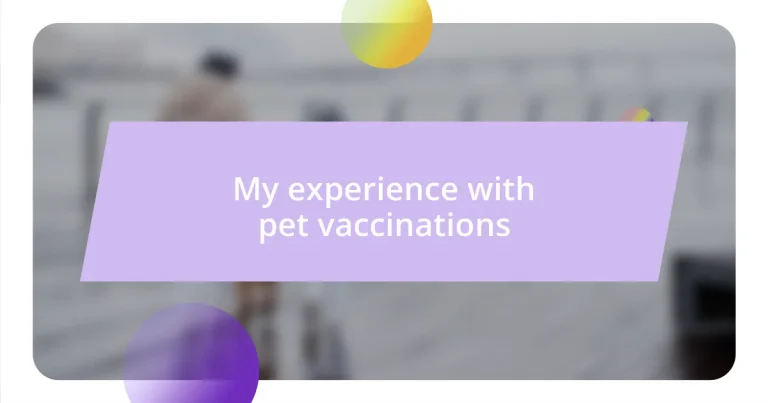Key takeaways:
- Vaccinations are vital for protecting pets from serious diseases, ensuring both individual and community health.
- Preparation and post-vaccination care, including hydration and comfort, significantly enhance the vaccination experience for pets.
- Common myths, such as vaccines causing behavioral issues or being unnecessary for indoor pets, can lead to harmful misconceptions among pet owners.
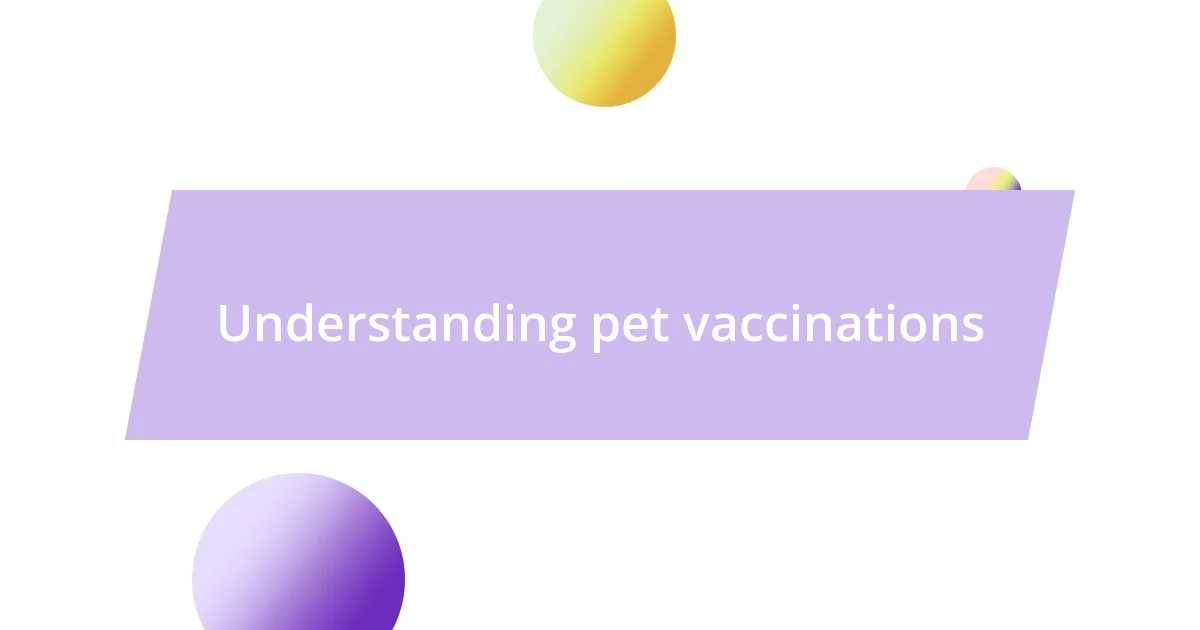
Understanding pet vaccinations
Understanding pet vaccinations is crucial for every pet owner. When I took my first puppy to the vet, I felt a mix of excitement and concern. I wondered, “What if the shots hurt him?” But as I learned more about vaccines, I understood they protect our furry friends from serious diseases.
Each vaccination serves a specific purpose, targeting various pathogens that can pose significant threats to our pets’ health. Do you remember the first time your pet received a shot? I still recall my little guy, Buster, shaking but thumping his tail right after. That moment reassured me; I realized those brief moments of discomfort were a small price to pay for the long-term well-being of my pet.
There’s something deeply reassuring about knowing that these vaccinations help prevent diseases like rabies, parvovirus, and distemper. I sometimes think about how many lives have been saved because responsible owners choose to vaccinate their pets. It’s not just about compliance; it’s about love and commitment to ensure our companions live long, healthy lives.
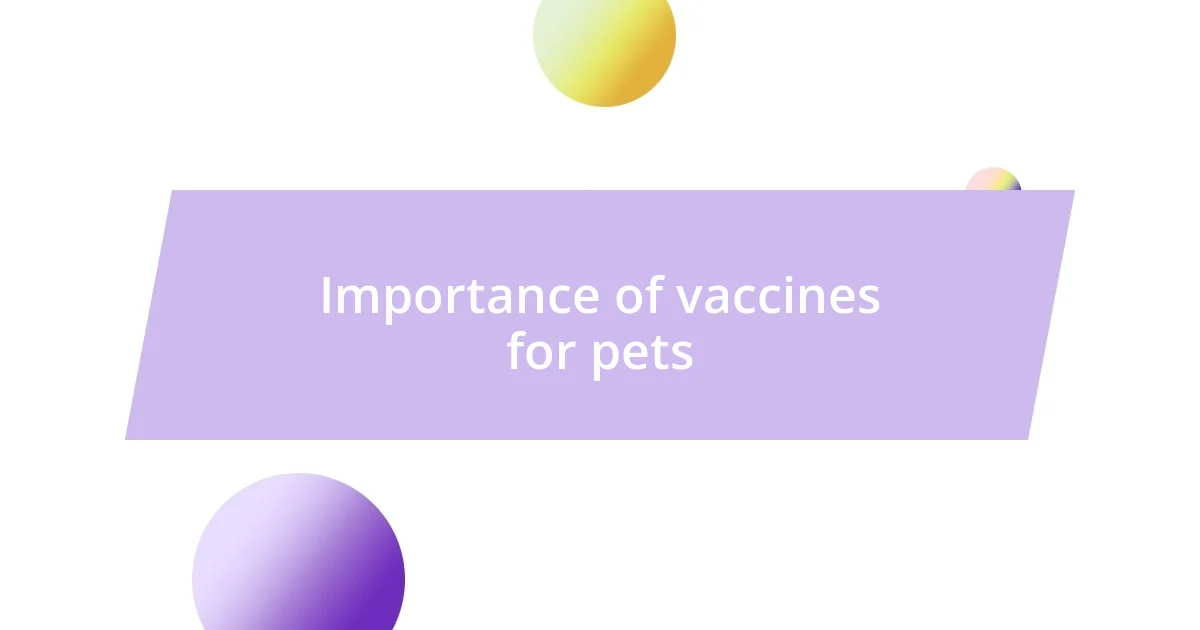
Importance of vaccines for pets
Vaccines play a vital role in safeguarding our pets from potentially life-threatening diseases. I still remember the day I learned about parvovirus after a friend shared a heartbreaking story about losing her puppy to the illness. It hit me hard and made me realize that vaccinations are not just routine; they are lifesavers. Each shot is a shield against specific dangers, and as responsible pet owners, we owe it to our animals to protect them.
In my experience, the burden of understanding the necessity of vaccines often falls on pet owners. When my older cat, Whiskers, received his annual shots, I felt a wave of relief wash over me. Those few minutes with the vet brought back memories of his kitten days, full of energy and innocence. This moment reinforced my commitment to his health, illuminating how vaccines help maintain a long and joyful life for pets.
It’s essential to remember that vaccines don’t just protect individual pets; they also contribute to the health of the entire community. Have you ever thought about how vaccinating pets can prevent outbreaks of diseases? When my neighbor adopted a rescue dog, I felt relieved knowing she had been fully vaccinated. It created peace of mind for me and others in our community, highlighting how our personal decisions can positively impact those around us.
| Vaccination | Importance |
|---|---|
| Rabies | Prevents a serious viral infection that affects the nervous system. |
| Parvovirus | Protects against a highly contagious and often fatal disease in puppies. |
| Distemper | Prevents an incurable disease that can lead to severe respiratory and neurological issues. |
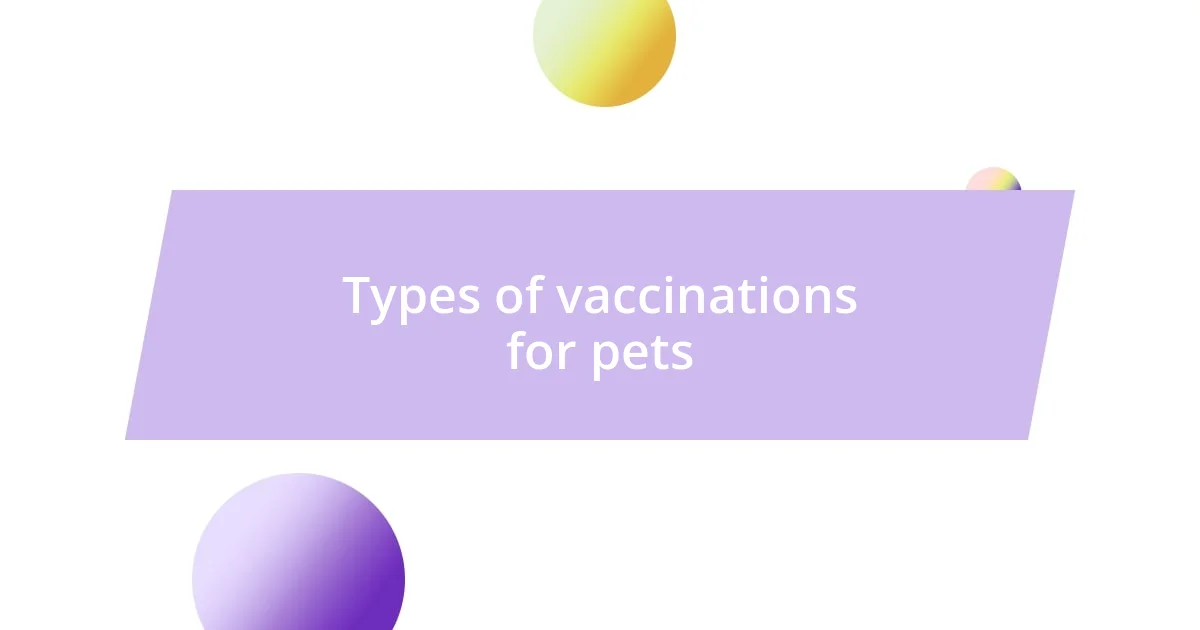
Types of vaccinations for pets
Types of vaccinations for pets
When I think about the different types of vaccinations available for pets, it reminds me of how each shot is like a unique entry on a protective shield. Just like I carefully consider my own vaccinations, I realize the same care should extend to our furry companions. For example, I remember when I brought my puppy Charlie to the vet for his first set of vaccinations. I could almost feel the weight of responsibility on my shoulders as I learned about the specific diseases each shot guarded against.
Here’s a quick rundown of the major types of vaccinations commonly recommended for pets:
- Core Vaccines: Essential for all pets, these include Rabies, Distemper, and Parvovirus vaccines.
- Non-Core Vaccines: Recommended based on lifestyle and environment, such as Bordetella (kennel cough) and Lyme disease vaccines.
- Combination Vaccines: These protect against several diseases in a single shot, simplifying the vaccination process for both pets and owners.
I find comfort in knowing that these vaccinations don’t just shield my pets; they contribute to their overall vitality and happiness. For instance, after Buster received his combination vaccine, I felt a sense of relief wash over me, knowing he was better protected during our outdoor adventures. It’s these moments that remind me vaccinations are a significant part of our pets’ journey toward a healthy life, enhancing our experiences together.
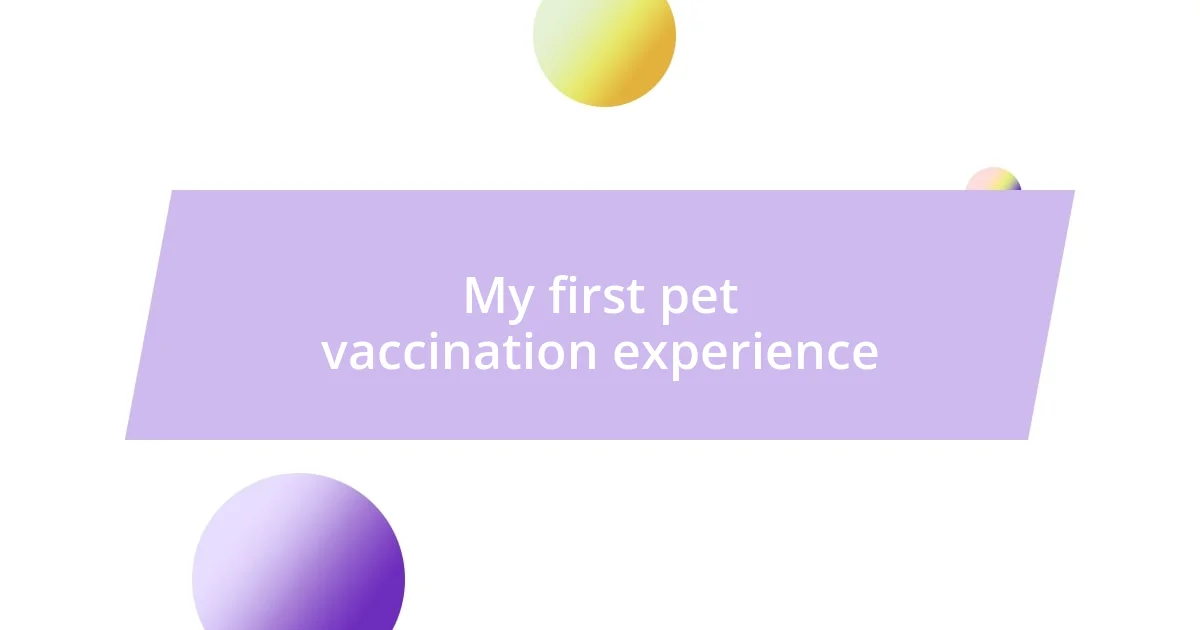
My first pet vaccination experience
I still vividly recall my first experience with pet vaccinations. It was early in the morning, and my little puppy, Bella, nestled in my arms, seemed utterly unaware of the day ahead. As we sat in the waiting room, my heart raced a bit—was I doing the right thing by subjecting her to a needle? Those minutes felt like an eternity, but looking back, I realize they were foundational in shaping my understanding of her health.
When the vet finally called us in, I thought I was just taking Bella for a simple jab, but it turned into a revealing lesson on her well-being. As the vet explained each vaccine’s purpose, I found myself hanging onto every word, feeling like a sponge soaking up crucial information. I remember being surprised to learn that some vaccines necessary for Bella’s age were not just routine; they were essential for keeping her safe from serious diseases. That knowledge empowered me, transforming my worry into determination.
After Bella received her shot, I held her close, and I felt an overwhelming sense of relief wash over me. Even though she whimpered just a bit, I knew I had taken an important step in safeguarding her future. What if I hadn’t? The thought of her facing the world unprotected was unbearable. I realized then that every vaccination was a promise I made to her, a commitment to nurture and protect her for years to come. Isn’t it incredible how a small moment can significantly impact our journey with our pets?

Preparing for your pet’s vaccination
Before heading to the vet for vaccinations, I always make sure to gather all required documents—it’s like packing for a journey! I remember the first time I forgot Bella’s vaccination records. It felt chaotic in the waiting room, and I learned quickly how much smoother things go when I’m organized. Having that information handy not only speeds up the process but also helps the vet know exactly what Bella needs.
In addition, I find that familiarizing my pets with the vet’s environment can ease anxiety. Charlie used to get nervous about the whole ordeal, but after a couple of friendly visits just to say hi, he became much calmer. It’s all about building positive associations for your furry friend. It’s always heartening to see them wag their tails rather than cower when it’s time for their shots. Isn’t it amazing how our little efforts can make such a big difference in their experience?
Lastly, what I consider essential is to ensure my pets are relaxed before the appointment. I usually take a brisk walk beforehand to help expend some energy. I can’t tell you how many times I’ve noticed a calmer demeanor in Buster after a little exercise. It feels rewarding to know I’m contributing to his peace of mind—even in a situation involving needles! If we can keep our pets comfortable, it sets a positive tone for the day ahead.
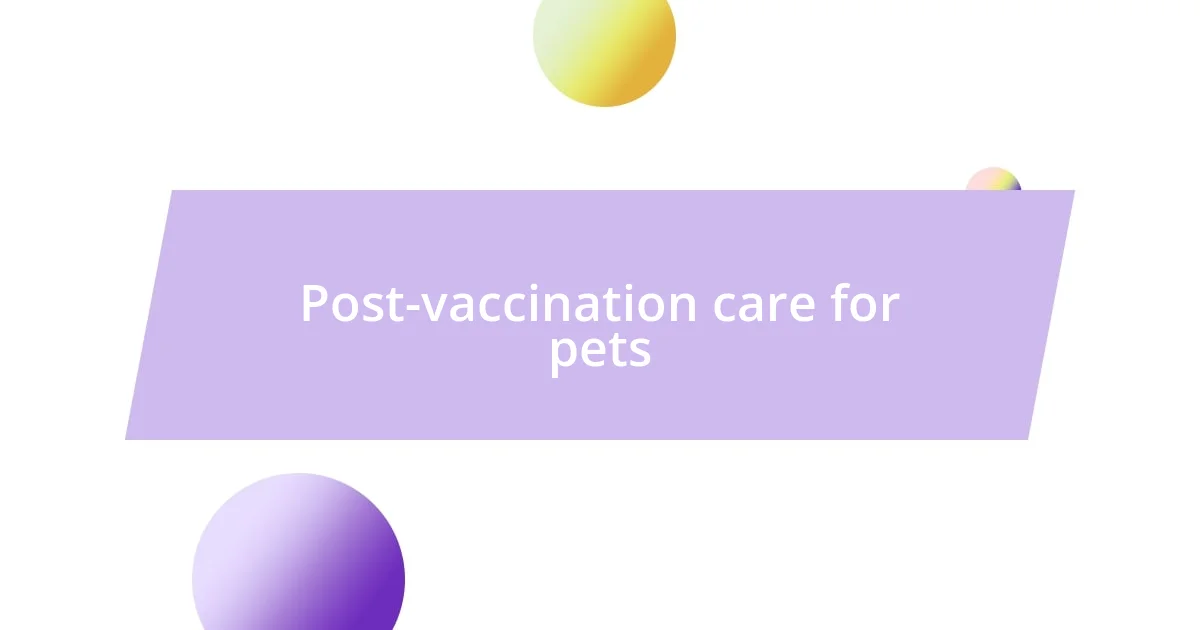
Post-vaccination care for pets
After Bella’s vaccination, I made it a point to monitor her closely for any side effects. I remember the first time I saw her a bit lethargic, and my heart sank; my instinct was to rush to her side. It’s normal for pets to feel a little off after their shots, but that didn’t make it any easier to see my energetic pup seem subdued. Keeping a gentle watch during the 24 hours following the vaccination helped me feel more reassured and allowed me to respond quickly if anything seemed out of the ordinary.
Hydration is another important factor that I often think about post-vaccination. I remember how Bella liked to drink less water than usual, which worried me after her shots. To encourage fluid intake, I brought out her favorite bowl and added a splash of chicken broth. Seeing her perk up and take a few enthusiastic slurps was a huge relief. It’s fascinating how a little creativity can help ease their discomfort and keep them on the right track—have you ever noticed how simple adjustments can make such a difference?
Providing comfort is key, too. I always set up Bella’s favorite spot with blankets and toys after her vaccinations. It became a cozy sanctuary where she could rest without any disturbances. Watching her settle in, I felt proud of my efforts to create a safe, comforting space. Isn’t it heartwarming to know that our love and attention can really help our pets recover from what they went through? It reinforces that bond and makes caring for them all the more rewarding.
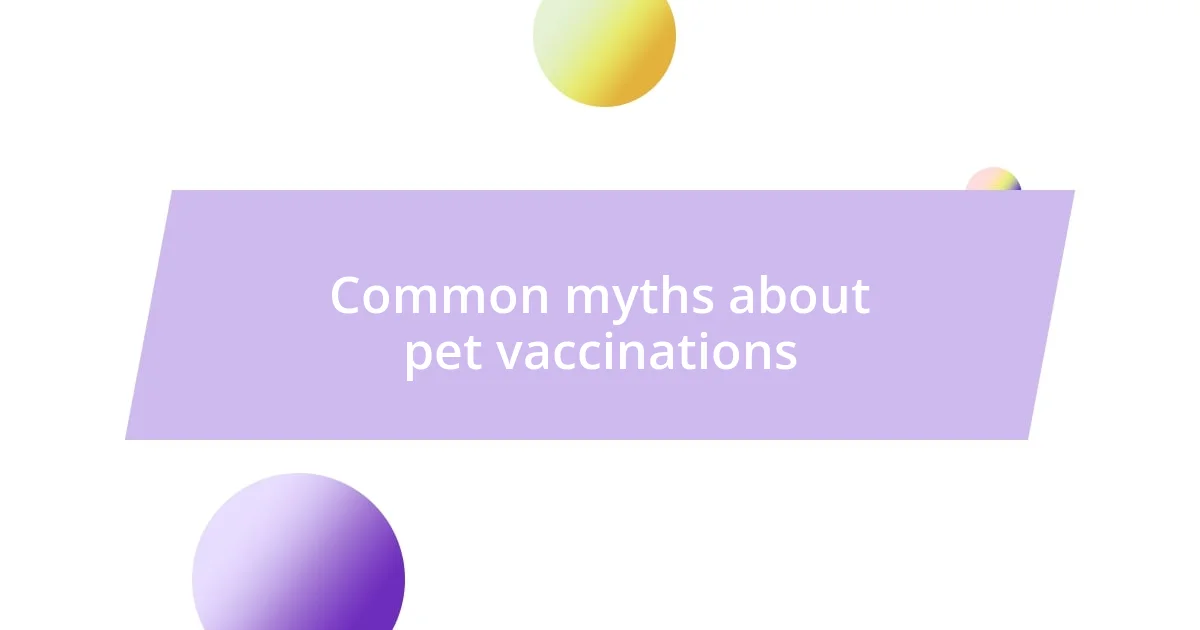
Common myths about pet vaccinations
It’s interesting how many misconceptions surround pet vaccinations. One common myth I often hear is that vaccines can cause autism in pets. This myth not only lacks scientific backing but can also lead to unnecessary fear for pet owners. I remember discussing this with a fellow pet parent who was worried about his dog’s behavior after vaccination. I reassured him that there’s no evidence linking vaccines to behavioral changes; it’s more about understanding the natural quirks of our companions.
Another misleading belief is that vaccines aren’t crucial for indoor pets. I used to think my indoor cat, Luna, was safe since she never ventured outside. However, an unexpected visit from an unvaccinated cat highlighted how germs can travel, even into our homes. Protecting pets through vaccinations ensures they’re safeguarded against diseases that can arise from unexpected encounters or even from the environment.
Lastly, some people think that once a pet is vaccinated, they don’t need any more boosters. Early in my journey as a pet parent, I learned the hard way when I skipped Bella’s booster shots, thinking she was fully protected after her initial vaccinations. When I later consulted the vet, I realized boosters are crucial for maintaining immunity over time. Isn’t it fascinating how a little bit of ongoing commitment can safeguard our pets for years to come?












